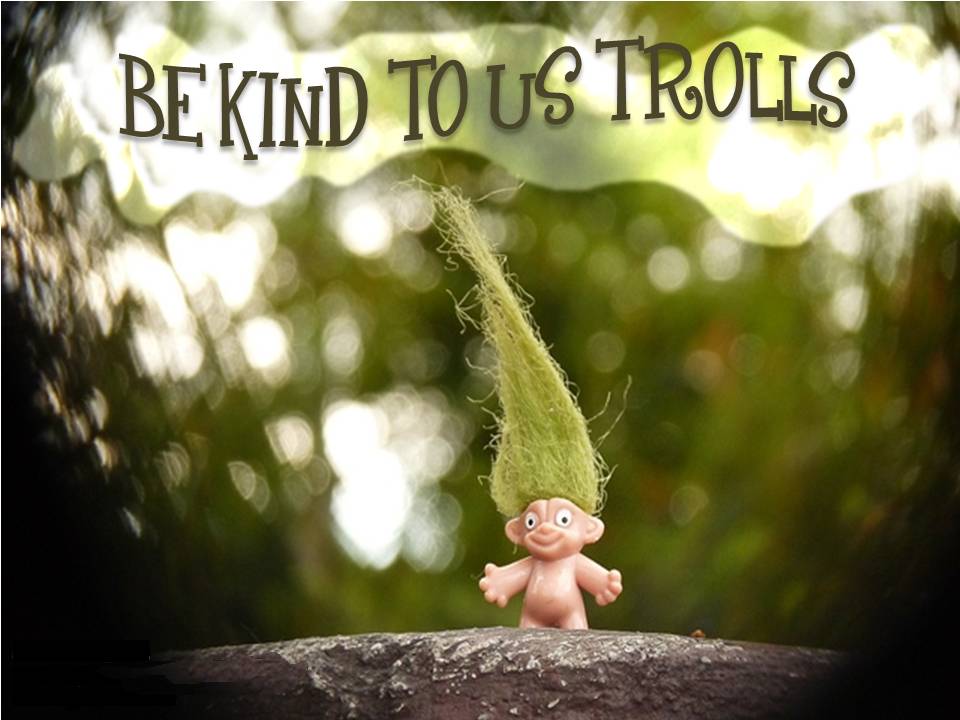What Is A Troll?
The term derives from "trolling", a style of fishing which involves trailing bait through a likely spot hoping for a bite. The troll posts a message, often in response to an honest question, that is intended to upset, disrupt or simply insult the group.
Usually, it will fail, as the troll rarely bothers to match the tone or style of the group, and usually its ignorance shows.
Why do trolls do it?
I believe that most trolls are sad people, living their lonely lives vicariously through those they see as strong and successful.
Disrupting a stable newsgroup gives the illusion of power, just as for a few, stalking a strong person allows them to think they are strong, too.
For trolls, any response is 'recognition'; they are unable to distinguish between irritation and admiration; their ego grows directly in proportion to the response, regardless of the form or content of that response.
Trolls, rather surprisingly, dispute this, claiming that it's a game or joke; this merely confirms the diagnosis; how sad do you have to be to find such mind-numbingly trivial timewasting to be funny?
Remember that trolls are cowards; they'll usually post just enough to get an argument going, then sit back and count the responses (Yes, that's what they do!).
How can troll posts be recognised?
- No Imagination - Most are frighteningly obvious; sexist comments on nurses' groups, blasphemy on religious groups .. I kid you not.
- Pedantic in the Extreme - Many trolls' preparation is so thorough, that while they waste time, they appear so ludicrous from the start that they elicit sympathetic mail - the danger is that once the group takes sides, the damage is done.
- False Identity - Because they are cowards, trolls virtually never write over their own name, and often reveal their trolliness (and lack of imagination) in the chosen ID. As so many folk these days use false ID, this is not a strong indicator on its own!
- Crossposting - Any post that is crossposted to several groups should be viewed as suspicious, particularly if unrelated or of opposing perspective. Why would someone do that?
- Off-topic posting - Often genuine errors, but, if from an 'outsider' they deserve matter-of-fact response; if genuine, a brief apposite response is simply netiquette; if it's a troll post, you have denied it its reward.
- Repetition of a question or statement is either a troll - or a pedant; either way, treatment as a troll is effective.
- Missing The Point - Trolls rarely answer a direct question - they cannot, if asked to justify their twaddle - so they develop a fine line in missing the point.
- Thick or Sad - Trolls are usually sad, lonely folk, with few social skills; they rarely make what most people would consider intelligent conversation. However, they frequently have an obsession with their IQ and feel the need to tell everyone. This is so frequent, that it is diagnostic! Somewhere on the web there must be an Intelligence Test for Trolls - rigged to always say "above 150"
Where are you likely to find trolls?
Wherever they are tolerated - this means forums and networking sites that have loose or lazy moderation, and places like Usenet (newsgroups) where there may be no moderation at all.
Where trolls are successful is a slightly different issue - some forums allow members to set an 'ignore' function, so they just do not see troll posts, after the first one, and some specialist forums are tightly focussed so that troll posts stick out a mile and are ignored - it's larger, more general forums that have issues, as it only takes a couple of members to be drawn in for the whole forum to suffer. They also thrive on 'opinion' sites, such as politics and religion, where feelings often run high anyway. But, again, only if moderation is weak.
Usenet has a special problem, as moderation is impossible; for trolls to be controlled, requires committed members using their killfiles effectively, and avoiding accidental cross-posting - which is all too easy with many newsreading software setups.
Some career trolls have set up their forums to exchange notes. These rarely thrive, as most trolls are not team players, and they simply fight among themselves. in other cases, they become centers for cyberbullying; while that's a sad development, it makes it easier to have the sites closed.
Who is at risk?
Any newsgroup, bulletin board, forum or chatroom can attract trolls, but they don't have the brains to attack nuclear physicists, and they are drawn to the quick response where sex, religion and race are found; so politics is easy prey.
One troll famously tried to infiltrate a mensa group; the results read like 100 trolls and one regular, it didn't have a chance - but it was stupid enough to persist until removed.
When Should You Be Concerned?
Usually, no, though fractured funny bones and occasional waves of nausea have been reported.
When a troll become persistent and personal, you may need to consider the possibility that it has fermented into an Internet Stalker - equally pathetic, if not more so - but sometimes requiring weedkiller.


Yeah bookmaking this wasn't a high risk decision outstanding post!
ReplyDeletemutuelle animal - http://alumni.smu.edu.ph/userinfo.php?uid=6078
ReplyDelete